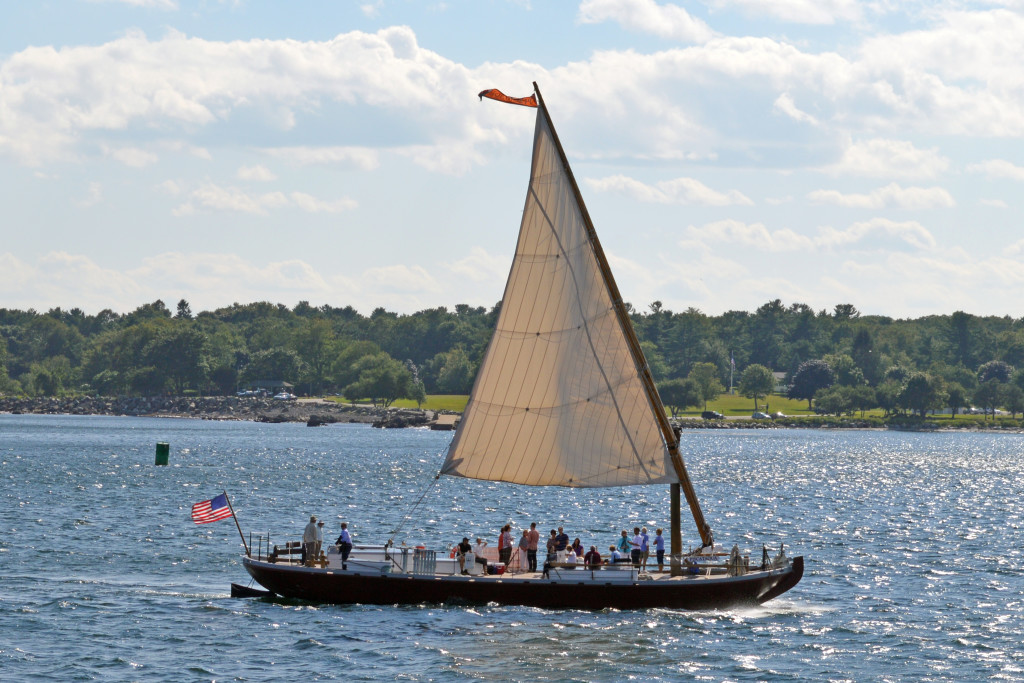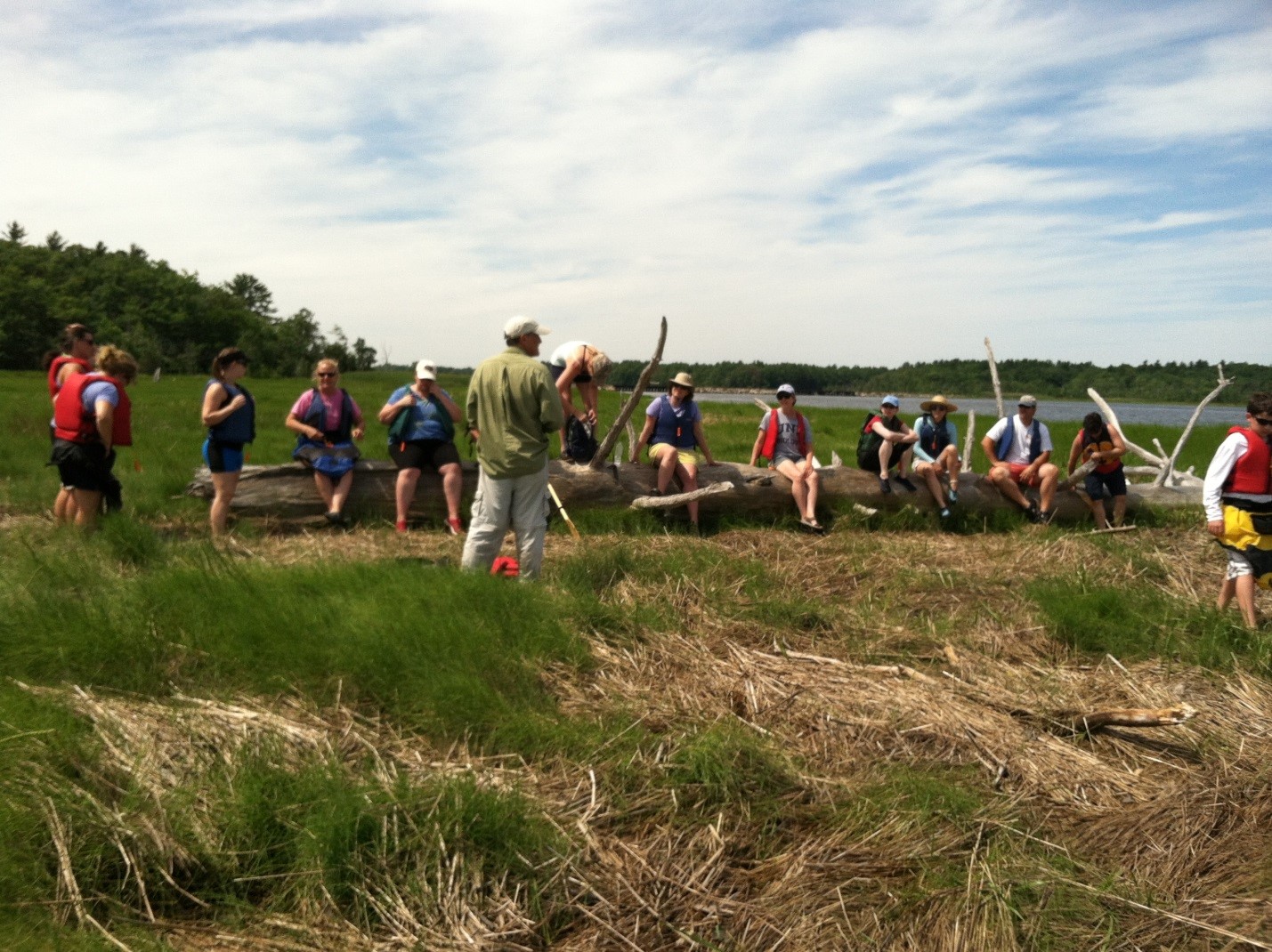

TEACHERS ON THE ESTUARY: “TOTE”
Wildlife and Fisheries in a Changing Climate
June 28 & 29, 2017 – Great Bay Discovery Center, Greenland, NH
Co-Sponsored by the Great Bay National Estuarine Research Reserve and the Gundalow Company
Teachers on the Estuary (TOTE), is a program of the National Estuarine Research Reserve System (NERRS) that offers field-based professional development for teachers on watershed and estuary topics at Research Reserves. In this workshop, Reserves use local research and habitats as a context for introducing teachers to coastal science and issues such as climate change and sea level rise. This year’s TOTE is co-sponsored by the Reserve and the Gundalow Company, whose mission is to protect the Piscataqua Region’s maritime heritage and environment through education and action. In addition, a $100 stipend will be awarded to each teacher to be used as part of workshop goals. Teachers will be asked to conduct a project with their students based on course content. The workshop activities have been correlated to Next Generation Science Standards and are designed for middle and high school teachers.
The majority of the activities will be hands-on or in the field, as weather permits. The course will include a full day (day two) aboard the Piscataqua Gundalow. We will also spend time reviewing online resources such as data sets from NOAA and the NERRS, including water quality graphing applications and the Estuaries 101 online curriculum for middle and high school students.
Please contact Kelle Loughlin, Kelle.Loughlin@wildlife.nh.gov at the Great Bay Discovery Center, with any questions and to register for this workshop. (603)778-0015.
Space is limited to 15 participants and teachers will be accepted on a first come first served basis.
Teacher take-home lessons:
- Climate impacts to coastal wildlife and fisheries
- How scientists study climate impacts to wildlife and fisheries
- What scientists are doing to address impacts
- Classroom activities on climate impacts to wildlife and fisheries
- Tools to bring back to the classroom for student projects

Day 1: June 28th – Hugh Gregg Coastal Conservation Center/Great Bay Discovery Center
8:45 Sign in, welcome, overview, pre-test
9:00 Introduction to the National Estuarine Research Reserve System and TOTE
9:15 Introduction to the Gundalow Company~What’s a Gundalow!? Gretchen Carlson, Gundalow Company
9:30 How Climate Change is affecting wildlife in NH/NH Wildlife Action Plan –Emily Preston, NH Fish and Game Department
10:00 Break, tour of the Center
10:50 Estuaries 101 – Classroom activities on climate and wildlife, how students can get involved
Noon Lunch (provided)
12:45 Climate impacts on Coastal NH species
- Osprey – Robin Ellwood, Rye Jr. High School Teacher
- Horseshoe crabs – Beth Heckman, Assistant Education Coordinator, Great Bay Discovery Center
2:30 Break at Gregg Center – Drive to Chapman’s Landing
- Sea level rise and the impact on Saltmarsh Sparrows – Bri Benvenuti, wildlife biologist
4:00 adjourn
Day 2: June 29th, – Portsmouth, NH (park at Pierce Island, near Prescott Park)
8:00 Arrive in Portsmouth – Carpool to Adams Point, Jackson Estuarine Laboratory – Durham, NH
8:45 Introduction to the day on shore at Adams Point
9:00 Board Gundalow/safety overview
9:20 – Otter Trawl for Great Bay species
10:00 –Anchor and ferry to historic Goat Island. Overview of the history of Goat Island
John Lamson: A life-long resident of Newington and Historical Society member, John will talk about the history of Goat Island, the original bridges and ferries, and lead a tour of the archeological sites the Society has been exploring on the island.
10:30– Oysters and aquaculture in Great Bay, Ray Grizzle, UNH.
Ray Grizzle: Ray Grizzle currently works as a research professor at the University of New Hampshire and has been with the university since 1999. He received his Ph.D. from Rutgers University in 1988.
11:30 Back on the boat and anchor up
12:00 Lunch provided on the boat – brown bag discussion on the cod fishing industry – Jeff Bolster, UNH
Jeff Bolster: Jeff Bolster has never been far from boats and the sea. As a young man, he sailed for ten years as a commercial mariner. Now a professor of History at UNH, he writes about the ocean. His latest book, an environmental history of the North Atlantic called The Mortal Sea: Fishing the Atlantic in the Age of Sail, has been awarded numerous prizes.
1:00 – Plankton tow and marine life of the Piscataqua River. Climate change and ocean acidification impacts to species.
2:00 Tour the Judd Gregg Marine Research Complex in Newcastle with Nate Rennels and a discussion by Gabby Bradt about the invasive green crab.
Nate Rennels: Nate grew up in Maryland and came to UNH for his undergrad work. He received a BS in Marine Biology in 2002 and has worked at the Judd Gregg Marine Research Complex on a variety of projects ranging from Open Ocean Aquaculture to winter flounder and currently as a supervisor of laboratory technical services.
Dr. Gabriela M. Bradt: Gabby is a NH Sea Grant/Cooperative Extension-Fisheries Specialist with a BA and an MA in Biology and a PhD in Zoology. Her work has focused on the NH fishing industry and local restaurants on direct marketing projects. She has also worked with state and local government agencies as well as non –profits, on marine debris projects.
3:15 Set sail back to our dock in Prescott Park
Setting up your own monitoring project in the classroom to track wildlife and climate – best practices
3:45 Wrap up
4:00 Departure
* This workshop is funded by the Great Bay National Estuarine Research Reserve, the Great Bay Stewards, the Gundalow Company, and in part, by NOAA’s Office for Coastal Management under the Coastal Zone Management Act in Conjunction with the NH Department of Environmental Services Coastal Program.


